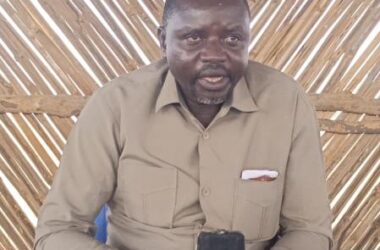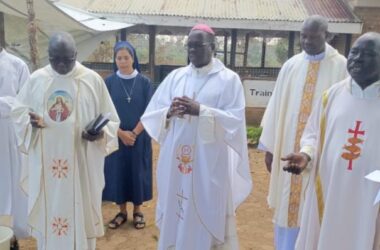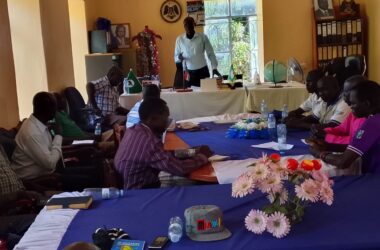By Kei Emmanuel Duku
Following a pivotal meeting between leaders from the National Constitutional Review Commission (NCRC) and the Central Equatoria State (CES) Cabinet, the state government has formalized its commitment to ensuring a broad, people-driven constitution that includes the voices of refugees.
The official Press Release detailing the outcomes was issued by Nyarsuk Patrick, Minister of Information and Communication, CES.
The State Minister of Information and Communication noted that Governor Rabi Mujung Emmanuel echoed his commitment that the CES constitutional making process will be a people drive constitution.
He added that the Governor encouraged the National Constitutional Review Commission to incorporate all views of different groups of people within Central Equatorial State, so that South Sudan as a nation will have a people drive constitution in order for the country to have peace and to have stability and to develop.
The Minister reiterated the state government’s commitment under the leadership of Governor Rabi Mujung Emmanuel, guaranteeing the National Constitutional Review Commission that, through the line institution, they are going to mobilize the people of Central Equatoria State from all the counties and the administrative area to give their views on the constitutional making process.
Patrick further added that the Governor directed the Commissioner of Juba County (who represented the other commissioners who were absent from the meeting) to mobilize the people at the grassroots level in order for the National Constitutional Review Commission to carry out their effort.
The Minister then stated: “The delegation focuses on two areas that they have really concentrated on: the public consultation of the constitutional making process and the civic education constitutional making process.”
The Minister furthermore stated that: “After briefing the Cabinet and the Governor of Central Equatoria State, the National Constitutional Review Commission looked into areas of operation and cooperation—specifically, how the Central Equatoria Government and the National Constitutional Review Commission can collaborate in order to carry out public consultation and civic education within the six counties of Central Equatoria State and Wonduruba Administrative Area.”
“In the middle of the discussion, the constitutional post holders in Central Equatoria State responded with their commitment to collaborate with the National Constitutional Review Commission. They pledged to carry out the consultation process within Central Equatorial State (across the six counties and one administrative payam), and to support the NCRC in terms of security and facilitation in some other areas. This collaboration is intended to ensure the National Constitutional Review Commission will have an effective work within Central Equatorial State in the process of consulting with the counties and the administrative area.”
However, the Minister said during the meeting that the Council also encourages the National Constitutional Review Commission: “to find ways to consult the views of the citizens of Central Equatorial State that have been displayed with the conflict of 2016 and 2013. Furthermore, the Council urged the NCRC to look into how they can be able to reach the neighboring countries to incorporate the views of the people of Central Equatoria State that are not based within the country as per the conflict that arose in 2013.”
Meanwhile, the Chairperson of the Constitutional Review Committee, Dr. Rian Yer Zuor, also spoke about the commission’s progress and the purpose of the meeting was to update the Government of Central Equatorial on the constitution-making process.
“As a commission, we have started going out to conduct nationwide civic education and public consultations. We have started with four states, Eastern Equatorial, Lakes, Western Bahr el-Ghazal and Northern Bahr el-Ghazal. The teams are out and they will be there for 30 days to conduct civic education and public consultations in those four states.”
He however said that still the commission was planning to send another four teams to the states, although they are yet to determine the number of states.
Zuor noted that Central Equatorial will be one of those states that will receive members from the commission to conduct civic education and public consultations.
“We have come to brief the Governor and the Cabinet on the issues that we want to resolve together with the state in the process of conducting civic education and public consultations in Central Equatoria.” Said Zuor.
He concluded that key in the commission’s agenda “discussion on security, coordination and many other areas so that these issues can be resolved before we send the teams out” And this is what we are here for and the state government will now deliberate on those issues that we have raised and they will communicate to us the resolutions of the meeting that they will conduct on the basis of the issues that we have raised.” He added.
The meeting concluded that the two institutions, the Central Equatoria State Government and the National Constitutional Review Commission, will collaborate to have an effective civic consultation program and civic education program within Central Equatoria State.
The National Constitution Making Commission informed the state government of their strategic plan and how they have a way and a strategy to reach the refugee camps to collect the views of the people of Central Equatoria State.
This is the only way the process will incorporate all the voices of Central Equatoria State is represented in the national constitutional making process.




